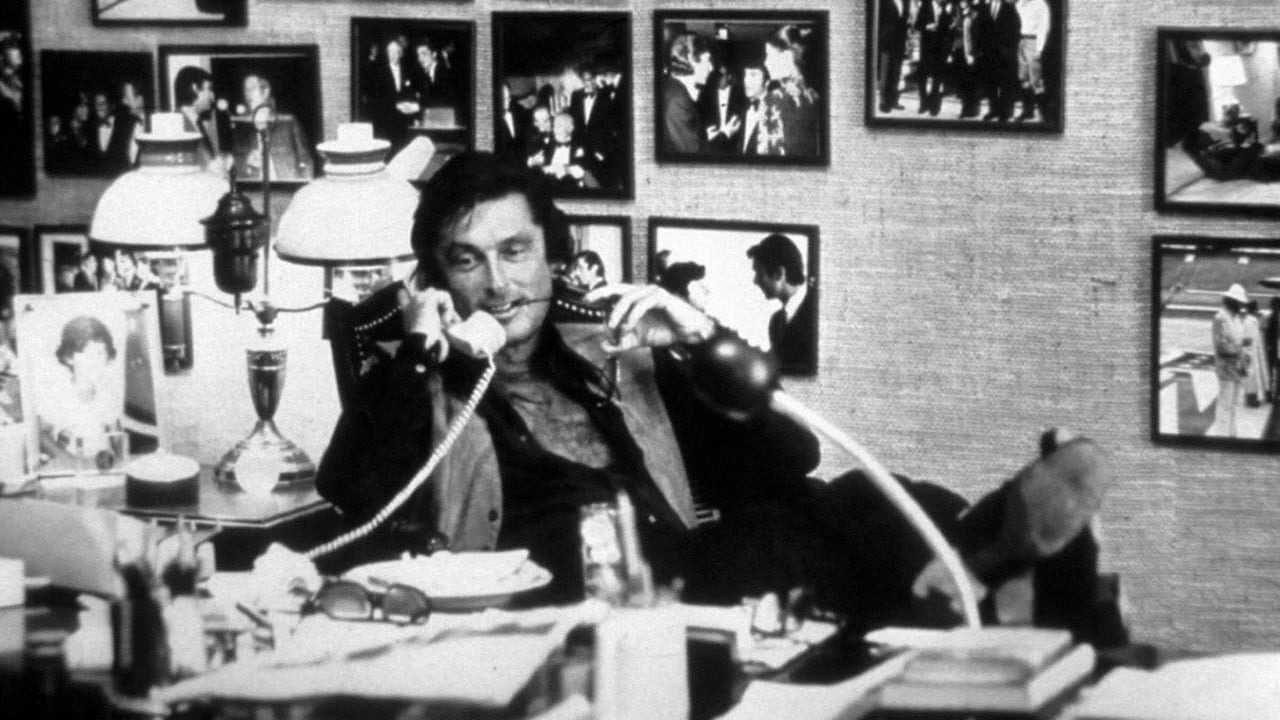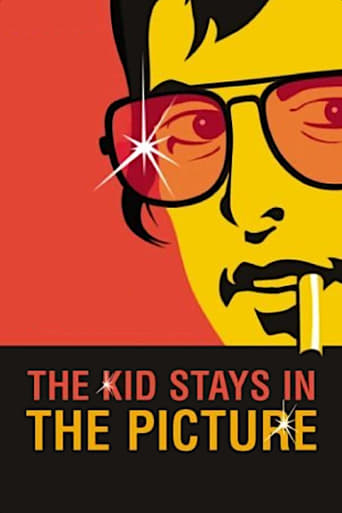

This Movie Can Only Be Described With One Word.
... View MoreReally Surprised!
... View MoreA brilliant film that helped define a genre
... View MoreThis movie was so-so. It had it's moments, but wasn't the greatest.
... View MoreI am not a scholar of filmmaking or a Robert Evans superfan. I didn't know who he was. I do enjoy watching good movies the way some people read good books - critically, thoughtfully, and with appreciation for the work that went into them. When I stumbled upon this movie, I thought I would gain some new fascinating insights into movie-making.Instead, the experience for me was analogous to the following: Imagine you are attending a fancy fundraising dinner full of rich strangers, or a fancy recruiting dinner for a big firm or company where you are interviewing. You are seated at the end of a table next to a man you have never met. Before you can tell him your name or learn his name, and without any further introduction of any sort, he simply begins talking, about himself, at length, without pause. You realize quickly that 1) he assumes you already know exactly who he is; 2) he assumes that you will find his stories absolutely fascinating and that he is bestowing a benevolent gift upon you by sharing these insider anecdotes with you; and 3) he is completely uninterested in the perspective or experiences of anyone else at the table, and has never entertained the thought that they have anything more meaningful to offer than what he is talking about right now. You are cornered. There is no one else near you at the table to talk to. You're not sure how much longer the event will last. You wonder how long you should let him go on before you just get up and leave. Eventually, the event simply ends, and you exit thinking, "Well it's unfortunate that the evening didn't turn out to be more pleasant." And that's how this movie proceeds, for over 90 merciless minutes. Robert Evans just keeps talking about himself, while grainy black and white photos flash on the screen.At first, I found it interesting, because this pompous blowhard was at least sharing little-known tidbits about some movies I had seen and enjoyed, and therefore I was learning something. But about a half hour in, that feeling went away, and I began to suspect I was not really learning much of anything.This is because I developed the sinking feeling that my narrator was unreliable. Every story is told solely from Evan's own perspective, and he features prominently as the most important and intelligent and visionary person in every one of them. It's not just that every movie he worked on was, dubiously, the Most Important Movie of Its Time. (Really? "Love Story"? Really??) It's also that, in every story, he is the key person who made a critical decision at some point that forever changed the course of the film's outcome. He is the one who made a critical casting decision, or convinced the director to make a critical editing decision, that shaped the entire film. He is the one who, in a single conversation, persuaded the star actress to finish the film instead of quitting. He is the one who plucked up a particular script and recognized it as exactly the story that America needed to hear at that time. And on and on it goes.So once I realized I couldn't trust anything he was saying, I was just waiting to see where it went. But there is nothing to help with the pacing. There is no plot or narrative arc to help you know where in the film you are. It just keeps going until it stops.I thought that a postscript at the end might contain quotes from others in the industry that would either corroborate or undermine Evans's own account of things, and help it all gel together as a documentary with a point of view or message. But it didn't.The only thing I learned here is that a guy named Robert Evans produced several movies I've seen, some of which I liked, and that man happens to have very, very high self-esteem.
... View MoreWomens fashions executive-turned-failed actor-turned movie studio chief Robert Evans remembers his life, perhaps narrating from his source autobiography in a tough-guy style filled with ego-inflated rhetoric and purple prose. Although Evans knows the movie business inside-out, and worked with or crossed paths with some of the biggest names of the 1960s and '70s, this film is about him...and he's not nearly as interesting as the celebrities who starred in his productions. Although mentioned as his friends, the personal troubles of Roman Polanski, Jack Nicholson or Francis Ford Coppola are never mentioned--not even in passing, nor as a reflection on how their scandals may have had an effect on Evans' life. Redundant documentary is both sketchy and flabby; it has some interesting film clips and soundtrack choices, but it doesn't present a well-crafted overview of Tinsel Town. This is the Cliff's Notes version of Hollywood via Robert Evans, Big Shot. ** from ****
... View MoreFilmmakers Brett Morgen and Nanette Burstein use the colorful, if expressive form of the documentary format to examine the wild life and tumultuous career of legendary producer and "self-proclaimed" bad boy.....Robert Evans.From clothing tycoon to Hollywood mogul, Evans became the first actor to ever run a major studio. Under his regime, Paramount Pictures went from poverty row to fulfilling riches thanks to the successes of ROSEMARY'S BABY, THE ODD COUPLE, LOVE STORY and THE GODFATHER. In 1974, Evans' first effort as an independent producer was Roman Polanski's masterpiece CHINATOWN which garnered his only Oscar nomination for Best Picture.Morgen and Burstein brilliantly capture not only Evans' roller-coaster career in the business, but they also explore the last true Golden Age of Hollywood movie-making in the 1970's. Eschewing the traditional documentary medium of using monotone narrators and talking heads, the filmmakers rely on Evans' ruthless, but engaging presence to take viewers on his personal journey. Of course, the 1980's were not that kind to Evans on a traumatic level; his devastating cocaine arrest, the box office disappointments of POPEYE and THE COTTON CLUB, and his unwitting implication in the murder of promoter Roy Radin.But somehow, Evans miraculously came back at the forefront of credibility. Although he's no longer at the top, the legendary producer has lived to tell the tale that would make a great double feature with Xan Cassavetes' Z CHANNEL: A MAGNIFICENT OBSESSION. It is a must-see documentary for film lovers and professionals everywhere.
... View MoreRobert Evans's book version of this documentary, The Kid Stays in the Picture, is still un-read by me. But I have read much about him from other movie books from the 70's, and so this film does illuminate certain aspects of him that I already knew- his huge ego, his drug addiction, his proclivity to lots and lots of women, and having some part in the more outstanding films of the 1970's. Sometimes with Evans himself narrating throughout two things become apparent as peculiarities that keep it from being great- 1) the filmmaker's style is rather repetitive and, aside from some flourishes of talent, isn't anything too grand for the material, and 2) the three sides to the story that Evans is quoted with at the beginning become rather blurred as one full-on nostalgia (for bad and good) comes out. What makes it captivating, however, is that Evans is the kind of guy who will be honest about being full of crap and will even call on himself for his past troubles. Rarely has one man's achievements gone neck and neck with his flaws, and let out in a filmic, grandiose style such as this.Evans is shown to have, basically, a lot of luck as someone getting into Hollywood (as many of these stories go). He starts out as a so-so actor and tries desperately to establish himself as a producer. He becomes more apart of the development side of the pictures, and ushers through Rosemary's Baby, Love Story, and even the Godfather to an extent. As his story includes the personal side (his rise and fall in the relationship to Ali McGraw, the cocaine, the other tabloid stuff), the other side of his professional accomplishments still gears in for room. By the end, one can see that the man has gone through enough to have his rightful reputation as Paramount's longest remaining producer, and will likely hold onto his ego of being the head-cheese kind of 'creative producer' so many directors like or dread till the grave. If anything, the film is actually too short, as at 93 minutes (a brilliant Dustin Hoffman imitation over the credits included) we only get glimpses that are further expounded in the book. Therefore its already subjective viewpoint becomes even more crunched into one all-too-simple story on such an interesting case study.The Kid Stays in the Picture, despite not being as terrific as the filmmakers might think it is by their sleek camera angles and typical interludes of montage, is as close to being as honest as it could be. Honest, in the sense that Evans doesn't hide much in his story and how his own way of speaking about it, in its deep-sounding and straight-forward Hollywood way, is what film buffs look for. He may have been and done a lot of things, but as he says at the end, "I enjoy what I do, which most people can't say that they do."
... View More